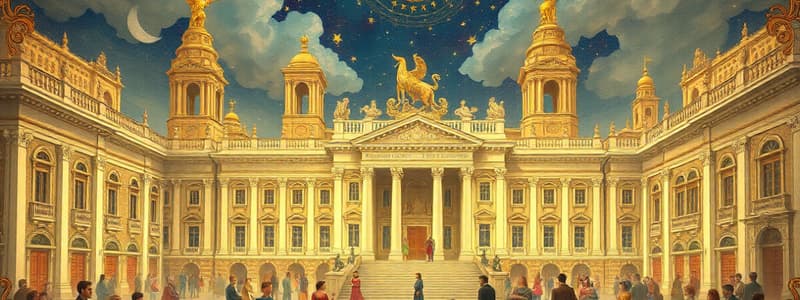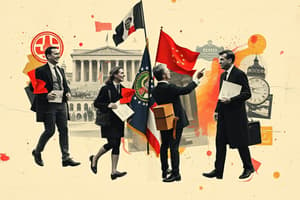Podcast
Questions and Answers
What is the literal meaning of the term democracy?
What is the literal meaning of the term democracy?
- Rule by the wealthy
- Rule of the military
- Rule of the people (correct)
- Rule by a single leader
In a parliamentary democracy, what happens if the prime minister loses support from the majority?
In a parliamentary democracy, what happens if the prime minister loses support from the majority?
- They resign immediately (correct)
- They remain in office indefinitely
- The legislature is dissolved
- Elections are called right away
Which form of democracy features a separation between the executive and legislative branches?
Which form of democracy features a separation between the executive and legislative branches?
- Consensus democracy
- Presidential democracy (correct)
- Parliamentary democracy
- Direct democracy
Which is NOT considered a key element of democracy?
Which is NOT considered a key element of democracy?
What characterizes the horizontal dimension of democracy?
What characterizes the horizontal dimension of democracy?
Which type of democracy allows citizens to directly participate in decision making?
Which type of democracy allows citizens to directly participate in decision making?
What is a key characteristic of constitutional democracy?
What is a key characteristic of constitutional democracy?
In which countries is presidential democracy commonly practiced?
In which countries is presidential democracy commonly practiced?
What does the vertical dimension of democracy focus on?
What does the vertical dimension of democracy focus on?
What is the main role of representatives in a representative democracy?
What is the main role of representatives in a representative democracy?
What characterizes a direct democracy?
What characterizes a direct democracy?
Which of the following describes the principle of civil liberties?
Which of the following describes the principle of civil liberties?
What is meant by 'balance of power' in a democracy?
What is meant by 'balance of power' in a democracy?
What aspect does wealth directly affect in a democratic society?
What aspect does wealth directly affect in a democratic society?
Which of the following best describes 'limits on terms of office'?
Which of the following best describes 'limits on terms of office'?
How does a representative democracy ensure public interest is pursued?
How does a representative democracy ensure public interest is pursued?
What common issue does gender inequality relate to in democratic practices?
What common issue does gender inequality relate to in democratic practices?
What is a common assumption about democracies regarding policy sensitivity?
What is a common assumption about democracies regarding policy sensitivity?
What does a meritocracy primarily focus on?
What does a meritocracy primarily focus on?
Flashcards
Direct Democracy
Direct Democracy
A system where citizens directly decide on policies through voting, not through elected representatives.
Representative Democracy
Representative Democracy
A government system where citizens elect representatives to make decisions on their behalf.
Meritocracy
Meritocracy
A system where individuals are rewarded based on their skills and achievements, often leading to opportunities for advancement.
Limits on Terms of Office
Limits on Terms of Office
Signup and view all the flashcards
Undemocratic Practices
Undemocratic Practices
Signup and view all the flashcards
Wealth
Wealth
Signup and view all the flashcards
Civil Liberties
Civil Liberties
Signup and view all the flashcards
Democracy
Democracy
Signup and view all the flashcards
Balance of Power
Balance of Power
Signup and view all the flashcards
Voting
Voting
Signup and view all the flashcards
Citizen Involvement
Citizen Involvement
Signup and view all the flashcards
Parliamentary Democracy
Parliamentary Democracy
Signup and view all the flashcards
Presidential Democracy
Presidential Democracy
Signup and view all the flashcards
Constitutional Democracy
Constitutional Democracy
Signup and view all the flashcards
Horizontal Dimension of Democracy
Horizontal Dimension of Democracy
Signup and view all the flashcards
Vertical Dimension of Democracy
Vertical Dimension of Democracy
Signup and view all the flashcards
Protection of Rights
Protection of Rights
Signup and view all the flashcards
Democratic Self-Renewal
Democratic Self-Renewal
Signup and view all the flashcards
Study Notes
Democracy
- Originated from Greek words "demos" (people) and "kratos" (rule), meaning rule by the people.
- A political system where the government is formed by the people.
- Key elements include: participation, equality, and justice in decision-making.
Types of Democracy
Constitutional Democracy
- Majority rule is limited by laws and institutions.
- Rights of individuals and minorities are protected.
- Practiced in Germany, Israel, Japan, and the United States.
Representative Democracy
- Citizens elect officials to make decisions on their behalf.
- Representatives are responsible for governance.
- Citizens vote for individuals to decide on laws and policies.
Direct Democracy
- Citizens directly participate in decision-making through voting on policies.
- Decisions made by majority rule.
- People decide on policies directly.
Monitory Democracy
- Relies on the assumption that democracies are capable of self-improvement and implementing policies.
Parliamentary Democracy
- Head of government is chosen by the legislature.
- Government remains in office until losing majority support in a vote.
Presidential Democracy
- Executive and legislative branches are separate and independently elected by the people.
- President is elected by the people, and elections occur at regular intervals.
Dimensions of Democracy
Horizontal Democracy
- Electoral system, number of parties, executive-legislative relationships, interest groups, and central bank independence.
Vertical Democracy
- Federalism, decentralization, bicameralism, rigidity of constitutional provisions, strength of judicial review.
Orthogonal Democracy
- Type of government cabinet, and the strength of direct democracy.
Voting
- Periodic, voluntary selection of leaders.
- Wealthy societies are better able to benefit all citizens.
Civil Liberties
- Protecting rights and removing barriers to individual success.
Balance of Power
- Large population, checks and balances, company and intellectual influence, free markets, etc.
- Ensuring a nation is guided by its people.
Meritocracy
- Reward system (incentives and disincentives) for criminals and/or society.
- Establishing order and some structure within society.
- Limits on terms of office and powers prevent individual overreach.
Representative vs. Participatory
- Participatory democracy involves elections among predetermined choices.
- Involvement of citizens is limited.
- Representative democracy encourages opportunities for public involvement in common good issues.
- Active citizen involvement.
Studying That Suits You
Use AI to generate personalized quizzes and flashcards to suit your learning preferences.




